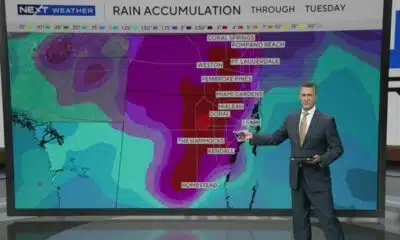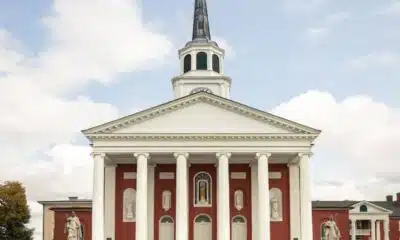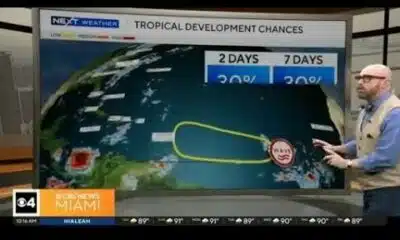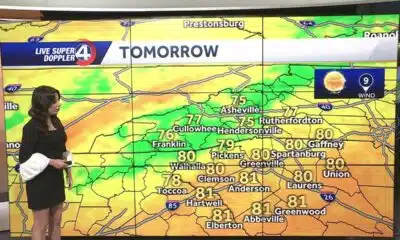News from the South - West Virginia News Feed
Federal disaster aid is uncertain for states even as Texas floods underscore need
by Alex Brown, West Virginia Watch
July 16, 2025
With hurricane and wildfire season well underway across much of the country, state and local emergency managers say they have little idea how much support the federal government will provide if disaster strikes. And the recent deadly floods in Texas have shown just how dire the need can be.
President Donald Trump has imposed severe cuts on the Federal Emergency Management Agency and denied some states’ requests for disaster recovery funds. FEMA also has failed to issue grants that many emergency managers rely on to fund their agencies — or to communicate its plans.
Wyoming’s Office of Homeland Security, which responds to disasters, relies on the feds for 92% of its money, said Director Lynn Budd. With that federal support in question, the state could face a precarious situation when the current grants expire at the end of September.
“If we don’t get this funding, what are we going to do?” Budd said. “You’re taking our capability away.”
Budd serves as president of the National Emergency Management Association, a nonprofit focused on public safety. She said state officials have been told by Trump that they’ve become too dependent on federal support.
Trump and officials in his administration have repeatedly talked of scaling back FEMA and pushing states to take the lead in disaster response. But in the wake of this month’s devastating flooding in Texas, administration officials have backed off Trump’s claims that he would eliminate the agency altogether.
White House spokeswoman Abigail Jackson did not grant an interview request, but issued a statement calling on states to play a larger role in disaster response.
State and local officials say Trump has provided no clarity about which disasters will qualify for federal recovery funds. He has denied support for disasters that met the existing criteria. At the same time, FEMA has yet to issue federal grants that provide much of the funding for local emergency management agencies.
As local leaders in rural Saluda County, South Carolina, work to rebuild from last year’s Hurricane Helene, they say the recovery process has been slowed by Trump administration policies making it more difficult to access disaster aid. Worse, the county’s Emergency Management Division has no idea whether the feds will release the grant funding that makes up most of its budget.
“Are we going to see the help we need arriving?” said Josh Morton, director of Saluda County’s Emergency Management Division. “I don’t know. When we pick up the phone, is there gonna be anybody there to answer?”
Aside from the cuts to state funding, FEMA under Trump’s administration has lost about a quarter of its full-time staff, according to The New York Times. The agency also cut hundreds of contractors at call centers, The Times reported, resulting in thousands of missed calls in the days following the Texas flood.
Meanwhile, emergency managers say that Trump’s cuts to the National Weather Service could further impair their ability to respond to fast-moving disasters.
The feds pull back
Trump and his administration have frequently said states should take on more responsibility for responding to disasters.
Brian Hughes, a spokesman for the National Security Council, said in an April statement to Stateline that the federal government would provide support only for “truly catastrophic disasters,” adding that states should have “an appetite to own the problem.”
Emergency management experts say it would be inefficient for all 50 states to stockpile the resources, staff and recovery funding to handle disasters on their own. Having a national agency that can deploy where it’s needed is far less wasteful.
“There’s no reason for every state to have all the resources that FEMA has,” said Michael Coen, who served as chief of staff at FEMA during the Obama and Biden administrations.
He noted that FEMA also plays a key coordinating role with other federal agencies during disasters.
There’s no reason for every state to have all the resources that FEMA has.
– Michael Coen, chief of staff at FEMA during the Obama and Biden administrations
Morton, the Saluda County official, echoed that concern. He also serves as first vice president with the International Association of Emergency Managers, a nonprofit representing professionals in the field.
“It would be impossible for every county in the U.S. to maintain an adequate disaster recovery fund on their own,” he said. “Right now, we have a disaster fund at the federal level, and that money is able to be moved around to where it’s needed in the moment. That really is the best bang for the buck for the American people.”
But that federal support is no longer a sure thing. Morton said recovery funds for Hurricane Helene — which walloped states from Florida to North Carolina — have been slower to materialize than for previous disasters. FEMA officials have required more paperwork, he said, and Homeland Security Secretary Kristi Noem’s insistence that she personally approve any expenditure over $100,000 has also slowed the process.
Disaster declarations
In other parts of the country, state officials have petitioned Trump for disaster declarations, only to be rejected altogether. Washington state’s request for disaster aid following storms last November that caused at least $34 million in damages met all the “very clear criteria to qualify,” said Democratic Gov. Bob Ferguson, but was denied by FEMA.
While Trump administration officials have proposed limiting the events that qualify for federal relief, they have yet to issue new criteria. State leaders say they have gotten no clarity from the feds about whether they can count on support.
“We really need some communication on what to expect,” said Budd, the Wyoming official. “If we know there’s no federal funding coming, that would be an awful situation, but at least we can plan for that.”
Some experts say states should prepare for disaster relief to be approved along partisan lines.
“We just have to be honest that this White House is going to spend more resources, time and effort on people who live in red states than in blue states,” said Juliette Kayyem, faculty chair of the Homeland Security Project at Harvard University’s Kennedy School of Government and a former Obama administration official.
“It’s a hard thing for me to admit, and I don’t know how to solve it, but if you look at his reaction to [the Los Angeles wildfires in] California as compared to Texas, it’s very clear.”
Since February, Trump has denied six of the 10 major-disaster requests he has received from Democratic governors, according to an analysis from Seattle National Public Radio affiliate KUOW. He has approved 14 of 15 requests he has received from Republican governors during that same period.
Meanwhile, FEMA has yet to release the preparedness grants that many state and local governments depend on to fund their emergency management agencies and conduct projects to prepare for disasters. Those grants were set to be issued in May under a spending bill passed by Congress.
Coen, the former FEMA official, noted that the Texas Division of Emergency Management received nearly $20 million in federal funding last year to support day-to-day operations.
“Texas hasn’t been able to apply for that grant this year,” he said. “If they never get that grant, are they going to have to lay off staff or cancel contracts?”
FEMA has also revoked another set of grants, totaling $3.6 billion, that was intended to help communities prepare their infrastructure to withstand disasters.
Weather agency cuts
Amid the uncertainty at FEMA, emergency managers are also alarmed by Trump’s cuts to the National Weather Service and the National Oceanic and Atmospheric Administration. NOAA has lost nearly 2,000 employees, The New York Times reported, 600 of whom worked for the weather service.
The cuts have left many forecasting offices understaffed, with some no longer able to operate overnight.
“The National Weather Service plays as big of a role in protecting lives as anyone else in government,” said Morton, the Saluda County official. “It would be very hard for emergency managers to do our jobs effectively without the National Weather Service. But if these cuts keep coming, you’re going to start to see deficiencies.”
Budd, the Wyoming official, said the weather agency is crucial during wildfires.
“That’s how we know when it’s time to alert our communities or evacuate an area,” she said. “You can put firefighters’ lives on the line very quickly if they don’t have notification that those winds are changing.”
She added that Trump’s cuts to the U.S. Forest Service and other land management agencies have added another layer of concern as wildfires begin cropping up throughout the West. With the loss of federal support, Budd said officials are likely to become increasingly reliant on state-to-state resource-sharing compacts that allow them to call on one another during emergency situations.
Stateline reporter Alex Brown can be reached at abrown@stateline.org.
GET THE MORNING HEADLINES.
West Virginia Watch is part of States Newsroom, a nonprofit news network supported by grants and a coalition of donors as a 501c(3) public charity. West Virginia Watch maintains editorial independence. Contact Editor Leann Ray for questions: info@westvirginiawatch.com.
The post Federal disaster aid is uncertain for states even as Texas floods underscore need appeared first on westvirginiawatch.com
Note: The following A.I. based commentary is not part of the original article, reproduced above, but is offered in the hopes that it will promote greater media literacy and critical thinking, by making any potential bias more visible to the reader –Staff Editor.
Political Bias Rating: Left-Leaning
The content criticizes the Trump administration’s policies on disaster relief, emphasizing cuts to FEMA and the National Weather Service, and highlighting challenges faced by state and local emergency management agencies. It presents concerns predominantly from state officials and experts who attribute difficulties to federal cutbacks and politicized disaster declarations. While the coverage is mainly fact-based, the framing and choice of quotes suggest a focus on the adverse impacts of a conservative administration, consistent with a left-leaning perspective.
News from the South - West Virginia News Feed
WV Supreme Court will hear BOE’s appeal in vaccine lawsuit — but not right away
by Lori Kersey, West Virginia Watch
September 5, 2025
West Virginia’s highest court will take on a legal battle over the state’s school vaccination requirements, but it denied a request by state school officials that it do so quickly.
The state Supreme Court on Thursday set a deadline of Dec. 12 for the West Virginia Board of Education to prepare its appeal of a Raleigh County judge’s July ruling against it. That ruling was in regards to a lawsuit brought by three Raleigh County families over the board’s refusal to accept religious exemptions to the state’s mandatory school vaccine requirements.
Raleigh County Circuit Judge Michael Froble in July granted a preliminary injunction in the case that allows students in the case to attend class with a religious exemption to the vaccination requirements.
The school board had filed notice of appeal and asked the high court to both expedite a review of the appeal and temporarily halt the proceedings in the lower court.
In the scheduling order Thursday, the court denied both motions. Justices also set a deadline of Jan. 26 for the plaintiffs in the case to respond to the board’s appeal. The board will then have until Feb. 16, 2026 to write a reply, if necessary.
After the Feb. 16 reply brief deadline, the court writes, the appeal will be ready for review.
The Raleigh lawsuit is one case in a legal battle over religious freedom and the state’s strict school vaccination requirements. Every state requires school students to be vaccinated against a number of infectious diseases including polio, chicken pox and measles. Florida officials announced this week plans to eliminate its vaccine mandates.
West Virginia has been one of only five states that have not allowed students to opt out of the shots because of their religious or philosophical objections to them.
West Virginia Gov. Patrick Morrisey issued an executive order on his second day in office requiring the state to allow religious exemptions. His order is based on the 2023 Equal Protection for Religion Act. He argues that the religious freedom law, when read alongside the vaccination law, calls for the religious exemptions.
Morrisey has not rescinded that executive order, even though the state Legislature earlier this year rejected a bill that would have established those religious exemptions in state code.
Raleigh County Circuit Judge Michael Froble has scheduled a two-day hearing next week on a permanent injunction in the lawsuit, which he recently consolidated with a lawsuit brought against the state health department by two parents of immunocompromised students over its issuance of religious exemptions. Plaintiffs in that case are represented by the ACLU of West Virginia and Mountain State Justice.
The hearing is set for Sept. 10 and 11 at the Raleigh County Judicial Center. During that hearing, the judge has said he wants to consider issues that include whether the state’s vaccination law is constitutional without religious exemptions and the authority of Morrisey’s executive order.
YOU MAKE OUR WORK POSSIBLE.
West Virginia Watch is part of States Newsroom, a nonprofit news network supported by grants and a coalition of donors as a 501c(3) public charity. West Virginia Watch maintains editorial independence. Contact Editor Leann Ray for questions: info@westvirginiawatch.com.
The post WV Supreme Court will hear BOE’s appeal in vaccine lawsuit — but not right away appeared first on westvirginiawatch.com
Note: The following A.I. based commentary is not part of the original article, reproduced above, but is offered in the hopes that it will promote greater media literacy and critical thinking, by making any potential bias more visible to the reader –Staff Editor.
Political Bias Rating: Centrist
The content presents a factual and balanced overview of the legal dispute surrounding vaccine exemptions in West Virginia without evident partisan language or framing. It reports on actions taken by government officials, court decisions, and ongoing lawsuits from multiple perspectives, including those of the state board, families, and advocacy groups. The neutral tone and focus on legal developments suggest a centrist approach, aiming to inform rather than persuade toward a particular political viewpoint.
News from the South - West Virginia News Feed
Christian’s Morning Forecast: Strong to Severe Storms Incoming
SUMMARY: Storm Watch meteorologist Christian Boler reports strong to severe storms approaching West Virginia, especially McDow, Tazewell, and Wyoming counties during the morning commute. Temperatures will remain in the upper 60s to low 70s with southwest winds around 5-10 mph. A marginal severe weather threat exists across the region, mainly involving winds and flooding, but no tornadoes or hail expected. Rainfall of a quarter to half an inch is likely over 48 hours with isolated downpours. Storms will arrive in two waves before clearing Friday. Another front may bring showers Saturday, but high pressure will clear skies for the weekend and beyond.
FOLLOW US ON FACEBOOK AND TWITTER:
https://facebook.com/WOAYNewsWatch
https://twitter.com/WOAYNewsWatch
News from the South - West Virginia News Feed
More states guarantee students the right to school-day religious instruction off campus
by Robbie Sequeira, West Virginia Watch
September 4, 2025
In the past month or so, federal courts have dealt a string of blows to conservatives’ push for the biblical Ten Commandments to be posted in public schools.
Yet as states lose over required religious displays, many are working on another route to faith-based education by allowing kids to attend off-campus religious instruction. This year, Iowa, Montana, Ohio and Texas passed laws guaranteeing parents the right to have their children excused during the school day for free, off-campus religious instruction, often called “released time.”
Those four states are the latest of at least 12 that require school districts to offer released time religious schooling upon parental request, including: Florida, Hawaii, Kentucky, New York, North Dakota, Pennsylvania, Vermont and Wisconsin.
The released time approach may be more likely to pass constitutional muster than other government-imposed religious efforts, experts say, by shifting influence off school grounds and under the direction of faith-based groups rather than public school teachers, and by making it free to students.
A 1952 U.S. Supreme Court decision in Zorach v. Clauson allows for released time religious instruction as long as it’s off school property, privately funded and parent permitted.
“Not every family has access to private or parochial school, but for many generations families have been able to take their students out of school for a portion of the day for religious education if they choose,” said Jennifer Jury, a program advocate for LifeWise Academy, an Ohio-based Christian nonprofit founded in 2018.
The organization has been active in expanding its reach and lobbying lawmakers for stronger legislative support. This school year, LifeWise expects to serve nearly 100,000 public school students across 1,100 schools in 34 states, Jury said.
The off-campus gatherings work the same way in most states: With parents’ approval, public school students sign out of school during a lunch, recess or study hall block. Students will either walk or ride one of the distinctive red LifeWise buses to a local church or a program-leased community building in town.
And depending on state limitations for the religious instruction, for either a half or full hour, kids will learn about the Bible. When the allotted time is up, students go back to their public school to finish the day.
In some states, students can earn academic credit for the off-campus instruction, which has been more controversial.
In Montana, for example, legislation that would have required school districts to develop policies for academic credit was amended to “authorize” a district to allow credit, after pushback from the state’s school boards and school administrators associations.
“School districts should have the autonomy to determine which external coursework aligns with the academic frameworks and whether such courses should be eligible for credit,” Rob Watson, who represented the two groups at the legislature, said in his comments to a House committee in February. He noted the groups did not oppose the released time policy itself.
Despite the changes, only one Democrat in the legislature voted “yes.” Montana GOP Gov. Greg Gianforte signed the bill into law in May.
Supporters had touted the academic credit option as a way to entice homeschooling families to consider public schools. In her interview with Stateline, Jury noted similar programs that accommodate Jewish, Muslim and Mormon faith-based teaching for public school students.
“Whether a person is religious or not, the Bible is widely recognized as one of the most influential books in history,” Jury said. “A lot of our Western culture was born out of ideas that come from the Bible, like the fact that every person is created equal, that we are to love our neighbor.”
Identical bill language
The conservative American Legislative Exchange Council, known as ALEC, in August adopted model legislation about released time policies that state lawmakers can propose.
Public schools would be required to allow dismissal for religious instruction under new bill
ALEC’s proposal would allow from one to five hours per week of off-campus religious instruction and would require school districts to award academic credit if the course meets certain criteria. Districts would have to assess instruction based on secular standards and would not be allowed to test for particular religious content, according to the model legislation.
Nearly identical language had already appeared in several state bills, including in North Carolina and West Virginia this year and in Mississippi in 2023. In North Carolina, LifeWise Academy registered with the secretary of state’s office in 2024, as reported by NC Newsline, and a released time bill was introduced in February. It was sent to committee but never moved ahead.
The bills in Mississippi and West Virginia also stalled.
Legislation that does become law earns praise from groups such as Alliance Defending Freedom, one of the nation’s most active legal organizations opposing abortion rights and same-sex marriage.
Statements from Greg Chafuen, senior counsel for the nonprofit’s Center for Public Policy, say the new released time laws respect “parents’ educational decisions” and ensure “parents are in the driver’s seat when it comes to their kids’ education.”
An Indiana law lets high school students leave school for religious instruction each week for an amount of time equal to one elective course. Ohio, Oklahoma, South Carolina and Tennessee laws allow students to earn elective credit for released time religious instruction, though it cannot replace a “core curriculum” class. School boards can set standards for when such programs qualify for credit.
LifeWise operates in each of those states.
Ten Commandment displays
Jury, of LifeWise Academy, said her organization wants off-campus religious options for public school students to be available in all 50 states.
“It’s important to note this is an option, and parents are the ultimate decision-makers in enrollment,” she said.
“We would love to see every student in the United States have the option to attend a program like LifeWise if they want to and if their parents want them to.”
A lack of parental choice might be what trips up state efforts to post the Ten Commandments in classrooms.
This is an option, and parents are the ultimate decision-makers in enrollment.
– Jennifer Jury, a program advocate for LifeWise Academy
After Louisiana last year became the first state in recent decades to require that the Ten Commandments, a central tenet of the Judeo-Christian tradition, be displayed in school classrooms, bills followed in at least 15 other states. Two states — Arkansas and Texas — enacted laws.
But for now, courts have blocked the mandates in all three states. In Texas, U.S. District Judge Fred Biery warned the displays “are likely to pressure [children] into religious observance” and undermine parents’ rights.
In Arkansas, U.S. District Judge Timothy Brooks called the state’s requirement to post a specific version of the Ten Commandments “plainly unconstitutional.”
The law “is not neutral with respect to religion,” he wrote. “By design, and on its face, the statute mandates the display of expressly religious scripture in every public-school classroom and library.”
He also noted that the law “requires that a specific version of that scripture be used, one that the uncontroverted evidence in this case shows is associated with Protestantism and is exclusionary of other faiths.”
Stateline reporter Robbie Sequeira can be reached at rsequeira@stateline.org.
This story was originally produced by Stateline, which is part of States Newsroom, a nonprofit news network which includes West Virginia Watch, and is supported by grants and a coalition of donors as a 501c(3) public charity.
West Virginia Watch is part of States Newsroom, a nonprofit news network supported by grants and a coalition of donors as a 501c(3) public charity. West Virginia Watch maintains editorial independence. Contact Editor Leann Ray for questions: info@westvirginiawatch.com.
The post More states guarantee students the right to school-day religious instruction off campus appeared first on westvirginiawatch.com
Note: The following A.I. based commentary is not part of the original article, reproduced above, but is offered in the hopes that it will promote greater media literacy and critical thinking, by making any potential bias more visible to the reader –Staff Editor.
Political Bias Rating: Center-Right
This content presents the growing trend of religious education programs in public school contexts with a generally favorable tone, highlighting legislative successes primarily in conservative-led states. The coverage includes references to conservative organizations such as ALEC and Alliance Defending Freedom, and discusses efforts to expand religious instruction in a way that aligns with conservative values emphasizing parental choice and the role of faith in education. However, it also acknowledges the legal challenges and concerns over constitutional boundaries, providing a balanced view that avoids outright advocacy or criticism. The framing and topics suggest a center-right perspective that supports religious accommodations within public education while respecting legal constraints.
-
Mississippi Today7 days ago
DEI, campus culture wars spark early battle between likely GOP rivals for governor in Mississippi
-
News from the South - Louisiana News Feed6 days ago
‘They broke us down’: New Orleans teachers, fired after Katrina, reflect on lives upended
-
News from the South - Missouri News Feed5 days ago
Missouri joins dozens of states in eliminating ‘luxury’ tax on diapers, period products
-
News from the South - Alabama News Feed7 days ago
Alabama state grocery tax to fall 1% on Monday
-
News from the South - Tennessee News Feed5 days ago
Tennessee ranks near the top for ICE arrests
-
News from the South - South Carolina News Feed7 days ago
Warm and Mainly Dry Labor Day
-
Mississippi Today5 days ago
Trump proposed getting rid of FEMA, but his review council seems focused on reforming the agency
-
News from the South - North Carolina News Feed6 days ago
NC Labor Day 2025: A state that’s best for business is also ranked worst for workers










































